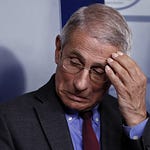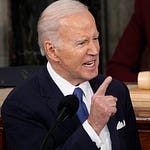Larry Bernstein
Welcome to What Happens Next. My name is Larry Bernstein. What Happens Next is a podcast which covers economics, finance, politics, and the arts.
The topic for today is Food Porn.
Our speaker is Rebecca Halpern who is the writer and director of a new documentary film Love Charlie that will be released in theaters and available for streaming on Apple and Amazon on November 18th. The film is about the life of Top Chef Charlie Trotter who revolutionized American cuisine. Charlie was a creative genius who used a different 10-course menu each day for 25 years. He introduced us to farm to table, placed table in the restaurant’s kitchen, and eliminated hard liquor and foie gras from the menu.
Charlie Trotter influenced many of the great top chefs of his generation and demanded excellence from everyone around him.
Buckle up.
I make this podcast to learn, and I offer this program free of charge to anyone that is interested. Please tell your friends about it and have them sign-up to receive our weekly emails about upcoming shows. If you enjoy today’s podcast, please subscribe so that you can continue to enjoy this content.
Ok, let’s start with Rebecca’s opening remarks.
Rebecca Halpern
Topic: Food Porn
Bio: Film Director and Writer
Film: Love, Charlie: The Rise and Fall of Chef Charlie Trotter is here
Transcript:
My name is Rebecca Halpern. I'm a documentary filmmaker. My latest film and directorial debut, Love Charlie: The Rise and Fall of Chef Charlie Trotter will be released November 18th in select theaters and on demand on Apple and Amazon.
Why is Charlie Trotter important? Chef Charlie Trotter reimagined American cuisine and made Chicago the culinary capital that it is today. Charlie and his team improvised 10-course tasting menus, never serving the same dish twice. He's credited with inventing microgreens, taking vegetarianism mainstream, and being the first American chef to put a table in his kitchen.
He's also the godfather of food porn, thanks to his groundbreaking style of photography, which he used in more than 14 cookbooks. Charlie's obsession with exceptional ingredients and his exacting management style drew ambitious chefs from all over the globe to his door. His flock of trainees have become the who's who of the culinary world.
Why make this movie? His legacy stands to be lost to time. Relatively few people know anything about him. I grew up in Chicago in the late 1980s and 90’s, and there were three giants who ruled the city: Michael Jordan, Oprah Winfrey, and Charlie Trotter. My mom was a food critic and often would talk about Charlie Trotter like he was some unicorn who was born to revolutionize the culinary world.
I was approached to direct this doc knowing only the media's caricature of him as a trailblazing but tyrannical perfectionist. I wanted to learn more about who he was, what made him tick, what drove his relentless pursuit of excellence, and what happened to him that ultimately made him flame out so spectacularly at the end.
What can we learn from Chef Trotter's story? Before he opened the restaurant, everyone in Charlie's life called him Chuck. He was a fun-loving dreamer whose passion knew new no bounds. Over the course of his career, Chuck gave way to Chef Charlie Trotter, his professional persona with devastating consequences.
This is not a film about food. It's a cautionary tale about what happens when a person's identity becomes consumed by their work.
There's an organizational psychologist named Adam Grant who recently posted a quote on Instagram that really resonated with the film. He said that asking kids, “What do you wanna be when you grow up?” Sends the wrong message about work. He said, “We should teach kids that who you are is more important than what job you do. That work is an activity. It doesn't have to define your identity.” And I think Chef Trotter's story is a perfect example of what can happen when it does.
Larry Bernstein:
You said that Charlie reimagined food photography in his 14 cookbooks. What did he do that was new?
Rebecca Halpern:
Before Charlie Trotter cookbooks were an instructional manual on how to put a dish together, very few illustrations, detailed instructions, not a lot of philosophy or the why behind a recipe exists. Charlie Trotter created coffee table cookbooks, where his photography was super intimate and up close with the food was revolutionary. It changed the way cookbooks were published. From that point forward, now there hasn't been a chef that's put out a cookbook that doesn't look like one of Charlie Trotter's cookbooks. Charlie also went deep on the philosophy, the why behind his recipes. Grant Achatz says in the film, the chef of Alinea, which is a three Michelin star winning restaurant, it was almost as if he could read and think about how the food would taste just from Charlie's cookbooks. And that's something that you didn't see before, and now it's ubiquitous
Larry Bernstein:
In the film you interview several important chefs of the Chicago food scene, including Grant Achatz. Grant describes an experience where he mishandles some peaches and Charlie berates a colleague for allowing Grant to do this, making Grant feel even worse. Why did you choose to include that scene and what does it illustrate about Charlie Trotter's management style?
Rebecca Halpern:
I'd like to back up for a second and talk about how Grant found himself at the restaurant. Grant fell in love with Charlie Trotter because of his cookbooks. It was through his cookbooks that Charlie Trotter seduced, not just Grant, but hundreds of aspiring young chefs. Grant, at that time, had a very contentious relationship with his own father and was looking for a mentor figure, someone that he could look up to. His hope was that Charlie Trotter would be that person. When he got into the restaurant and started working there, he quickly realized that Charlie was not the warm and fuzzy mentor that he was hoping for.
Charlie was a task master. He didn't understand that maybe you just needed coaching or a softer hand. He didn't really care about what he could do to get you to do your best. Sometimes it was manipulative and sometimes it was toxic. But to those people who stuck with him, who saw the world the same way he did, they had remarkably wonderful experiences. So, I think it's a two-sided coin.
Larry Bernstein:
Rebecca and I both went to New Trier High School in Winnetka Illinois as did Charlie Trotter. It's a powerhouse. How do you think the New Trier experience affected Charlie Trotter's path?
Rebecca Halpern:
New Trier is called the Harvard of high schools, and I think anyone who went there found that New Trier was infinitely harder than their undergraduate career. The expectations on all of us were huge. Every kid that goes to New Trier has a leg up on most every other kid in the world.
Charlie was viewed as an entitled whose father bankrolled him before he had any real work experience. Luckily, he had this incredible talent. But when he told his parents he wanted to be a chef, they were like, “What? You want to go into the service industry?”
You are an artist when you are at the level of Charlie Trotter. I think he viewed it that way.
Larry Bernstein:
Charlie may have been entitled because his dad bankrolled his restaurant opening, but amazingly, he convinced his dad to work as his operations manager and his mother to work in coat check before he promoted her to hostess.
I want to turn next to Michael Jordan and my favorite scene from the ESPN documentary The Last Dance. In it, Jordan has been pushing his players as hard as possible to maximize their 2performance and his teammates conclude that he was a complete asshole. We had the producer Michael Tollin on the podcast, and I asked him, what was the most important scene in that 10-part documentary? And he said, “at the end of act 2, I asked MJ the question was there a personal cost for being such an asshole? And Jordan became so emotional that we had to stop filming.” Why do these incredible performers, the best in their respective field, think they need to be an asshole to inspire excellence, especially when it comes at such a high personal cost?
Rebecca Halpern:
When you are blessed with the talent that Michael Jordan or Charlie Trotter had, you develop a sense that everyone who's in your orbit should have that same level of talent and that same dedication to excellence. Charlie Trotter is often mistaken for a perfectionist, and that couldn't be further from the truth. He thought perfection was boring. Perfection is about the outcome. Excellence is about the process.
He felt that how you closed a cabinet door, how you took out the trash, how you set a table, how you did your mise en place, how you made a piece of fish, how you delivered it to the table, every element of the process required the same level of care. He had dishwashers who ascended to the top of the food chain in his restaurant. Why? Because they demonstrated a certain level of care in what they were doing.
We called the film “Love, Charlie” for a reason. For Charlie, the quest for excellence, that relentless level of care that he poured into everything he did, was his idea of love.
And I think that quest for excellence, anyone who's gotten really good at anything in life who's spent 10,000 hours doing anything, you don't become great at something because you don't care. You have to pour attention into every single detail. I used to play competitive golf. I understand what it means to care as much about the blade of grass that your ball is sitting on as the wind that's blowing and there at that moment and what the golf course layout is like, and course management is part of it.
I have to care about my golf shoes, make sure there's nothing stuck under my cleats. I have to make sure that my glove fits me perfectly so that my grip every time I grab the club is the same. I want to make sure that my irons are clean so that within each groove there's not a piece of grass or anything that could influence the way the ball spins coming off the club face. That's care, that's excellence.
Michael Jordan demanding that people show up and be excellent every day in everything they did. I don't think that that's a bad thing. I don't. And people who are challenged to be excellent don't like it a lot of times. And they resent that. In Charlie's case, there were people in his orbit who he pushed them too far, and they resented him for it.
Larry Bernstein:
In your film you show Charlie’s funeral. The church was packed with former customers, co-workers, and other top chefs. Sure, he rubbed a lot of people the wrong way, but many people there loved him because he pushed them to be their best selves.
Rebecca Halpern:
Getting people to do their best, especially if they were on board with his approach, he derived a great deal of satisfaction out of that. But ultimately, I don't think it was about them ever. It was always about him and his restaurant and what he was striving for. Charlie Trotter was a narcissistic, self-centered guy who did a lot of what he did so that the shine would come back on him.
Larry Bernstein:
One of Charlie’s claims to fame was his daily, never repeated 10-course tasting menu that showed his creativity. In contrast, other great chefs create a spectacular dish and then repeat it to highlight their strengths. Not Charlie, he wanted to show you each day he could do something different that was amazing. Why did he do that?
Rebecca Halpern:
I think it's partly showing off. It's partly a love of improvisation. He loved jazz. It was also partly about challenging his staff to stay on their toes and be fresh. When you're a fine painter, let's say, and you squeeze a tube of paint, what color is coming out of that tube? The consistency, the texture, the weight, exactly how to use it on the canvas.
Food cuisine at the level that Charlie was cooking is infinitely more difficult because you're dealing with ingredients that are completely out of your control. There is no tube of paint that you can squeeze and guarantee you're going to get the same exact texture, flavor, scent out of every time. The improvisation for Charlie is all the more impressive when you think about these factors, that the ingredients that he was using, and every time he opened his toolkit, he never knew what he was going to get. If he got a batch of bad red peppers, he'll find something else. And he thrived on that too.
He also was the only chef who served only wine, and it wasn't like he did wine pairings. He designed his dishes around the flavor, the immutable flavor of the wine. You can't change the way wine tastes, but you can change a dish to satisfy the wine. And so his relationships with his sommelier were very close for that reason.
Larry Bernstein:
Charlie wrote an important book about serving wine with food. He also announced to great fanfare that he was going to remove liquor and hard alcohol from his restaurant.
Rebecca Halpern:
It was another way for Charlie Trotter to show off and be different. He loved to be considered an enigma. He loved it when people didn't understand why he was doing what he was doing. And going strictly to wine did help compliment his food and create a better dining experience, which was completely in his control. When you're doing a 10-course tasting menu with few deviations, you are in command of the conversation. It's a monologue necessarily that you're listening to from the chef. I mean, that's what it is.
If he wanted to do only wine, he could do only wine. If he wanted to put a table in the kitchen, he could put a table in the kitchen if he wanted to treat people like crap; he did it how he wanted to do it. Chef Charlie Trotter becomes consumed by that level of corruption of thinking he can get away with anything, he can do anything he wants, just kind of grew almost out of control.
Larry Bernstein:
Burger King makes the customer the decision maker, have your way, but not Charlie Trotter. He did not offer an a la carte menu. He decided what you're going to eat tonight. Just like if you go to the symphony, the conductor decides what gets played. He viewed the consumer as secondary relative to his own vision of what food should be. How do you think about Charlie’s overbearing, paternalistic attitude towards the customer’s culinary experience?
Rebecca Halpern:
I mean, that was part of his philosophy. Nobody crowds sources a skyscraper. It's the vision of the architect. He was a control freak. He wanted things to be exactly how he wanted them to be, and he viewed himself as an artist. And he was well within his right to do that.
Larry Bernstein:
Next topic is Charlie’s health. He had several minor strokes. His doctors told him that his health was failing. In the film you made it seem that his work was killing him on the one hand but not working was a death sentence. How do you think about Charlie’s choices at the end of his life?
Rebecca Halpern:
He did drive himself so hard that he ended up killing himself.
He made choices that ultimately led to his own demise. Doctors told him not to fly because of his inoperable brain aneurysm and he made the choice to fly to Wyoming and the next morning was found dead on the couch by his son.
It was like he was playing Russian roulette at the end there. And I feel for Charlie Trotter because I know what it's like to become addicted to the detriment of your own personal life, of your relationships, of your own health. When it came time to just be Chuck again, he couldn't do it.
Larry Bernstein:
Let's talk about Charlie’s first wife Lisa who plays such an important role in the film. She had a chance to go to law school and follow her career, but Charlie persuaded her to abandon her dreams and adopt his. Charlie becomes consumed by his restaurant and that’s the kiss of death for their marriage. What do you think about that relationship and what does it show about Charlie?
Rebecca Halpern:
It requires a team to get across the finish line. Lisa, I wanted to really give her due for helping open the restaurant, helping shape his vision, helping him to explode onto the scene the way he did.
Their relationship suffered. If you're obsessed with your career, things are going to fall by the wayside. So, in terms of his weakness, it was just a foretelling of what was to come for him. They broke up a couple years after the restaurant opened and he immediately remarried a woman who was working for him named Lynn. And the two of them, Lisa and Lynn, could not have been more different. Lisa was much more intellectual. Whereas Lynn, she's got this big blonde hair and she's glamorous and has this movie star looks to her. He was trying to control his image and he picked his leading lady in that moment.
Larry Bernstein:
Let’s move to the Charlie Trotter brand. The first time I heard about Charlie Trotter was when he opened that shop next door to his restaurant which sold various Charlie Trotter goods like smoked salmon and other dishes.
Rebecca Halpern:
You can still get his smoked salmon at Whole Foods and it's insanely good.
Larry Bernstein:
I'm on that. I moved to back to Chicago in 1999, when Charlie Trotter was still the Restaurant King of Chicago. He then opens up franchises in Las Vegas and Mexico and they’re not successful. What did he do wrong?
Rebecca Halpern:
He believed in his brand so much that there was absolutely no flexibility. His restaurants in Vegas failed. Why? Because they want to turn tables in Vegas, they want people to be gambling for as long as possible. A meal that lasts three hours is a non-starter for a casino operator, but Charlie Trotter refused to budge.
He was going to open a restaurant at Time Warner in Columbus Circle, and they wanted him to move in a fast-casual kind of a direction and he refused because it wasn't his brand. That hurt him only in so far as his inability to scale up. But it wasn't a bad thing necessarily. If you are known for one thing and you do that one thing really well, you should stick to that one thing.
His TV show, people loved it. The reason he didn't become a Food Network star was because Charlie Trotter is not Emeril. He's not as charismatic, he's not as telegenic and he's not as pleasant to watch. He has this elitist vibe to him that for the masses, I don't think appeals. He started to get stretched thin and didn't have the business infrastructure.
His dad was gone. He didn't have anyone in his court giving him great advice on how to scale up in that way. Also, he wanted three Michelin stars. That was his lifelong goal. Your art will suffer if you don't have the right infrastructure in place and if you can't let go and delegate properly.
Larry Bernstein:
I would like to play a clip now from your film Love Charlie.
Larry Bernstein:
In the 1980s, French high-end cooking was the rage. Julia Child introduced French cuisine to the American public through television, in a way that amused, surprised and beloved her audience. Charlie learns about French techniques that rely heavily on cream and butter. Tell us about Charlie’s decision to follow a completely new direction that becomes nouveau American cuisine.
Rebecca Halpern:
He certainly introduced a new style of American cuisine. They hardly used any cream or butter in his cooking. He was a huge proponent of vegetarianism. He offered two 10-course tasting menus. One was a meat menu and the other was a vegetable menu. He felt that vegetables deserve just as much attention as any kind of beef or poultry or fish.
What was interesting was Charlie's trip to Europe didn't last very long. He was backpacking, eating at very fancy restaurants, leaving his backpack up with the Maître D’, and look at what he was able to absorb and synthesize. Charlie Trotter was in his early twenties, didn't have hardly any work experience, certainly very little formal training. It's pretty remarkable what he was able to take and borrow from the French and then make his own.
Larry Bernstein:
Let’s run a second clip from the film. Here we have chef’s Wolfgang Puck and Emeril talking about what made Charlie Trotter’s methods so innovative.
Larry Bernstein:
Rebecca, tell us about Charlie’s concept of farm-to-table cuisine.
Rebecca Halpern:
Charlie Trotter made a concerted effort to build relationships with purveyors in ways that other chefs weren't. Not only was he seeking them out to procure the best food they had to offer, but he was working with them to create the kinds of vegetables that he wanted to put on the plate. There's a chef in Ohio named Farmer Lee Jones, who he worked with very closely. He called him up one day and said he was tired of salad greens. What can we do next? Together they innovated microgreens, which are ubiquitous now. There are microgreens on burgers, there's microgreens on salads. They use them as garnish on desserts. I mean, everyone uses microgreens. That was revolutionary about Charlie's approach to the farm-to-table movement.
Larry Bernstein:
Let’s talk about food critics. You mentioned your mother was a food critic. The world shifted away from the food critic to recommendations by ordinary customers with the Zagat Guide and now with Yelp and Open Table reviews. How do you think about the demise of the food critic and their role in determining taste?
Rebecca Halpern:
I always laugh whenever anyone I'm going out to dinner with ask the waiter what's good here. First, you've never met this waiter. You don't know if you share the same taste as this waiter. The waiter could be telling you what's the most popular thing on the menu, but who's to say that any of those people share your tastes?
I don't know that the food critic necessarily serves a purpose. My mom was really a food writer. If she had a bad experience at a restaurant, she just wouldn't write about that restaurant and give it any shine. And I think that's great. Celebrate excellence and the rest, they'll find their own future, their own way. They'll either go away or they'll stick around.
There is a place for food criticism. People who write about food in the same way that art critics write about art, where it looks at the body of work of this one chef and where are they today versus where they started. I think some food criticism, while warranted, is also just about creating news, it's click bait frankly.
Larry Bernstein:
How did Charlie Trotter think about publicity? You mention in the film that he got lured into making outrageous statements, but that only seems to help his brand. Is there no such thing as bad publicity?
Rebecca Halpern:
He did call Rick Tramonto, who is the other top chef in Chicago, fat and threatened to eat his liver. All press is good press, especially when there are people nipping at your heels and you want to stay ahead of them. There was a tenor to the coverage of Charlie Trotter that seemed like the media and others were looking to take him down. It was egregious in some respects.
That was a kind of journalism that I don't believe in, which is this gotcha journalism where you're looking for people at their worst. The way the media treated him was just painful to watch.
Larry Bernstein:
The next topic is the art of documentary filmmaking. You foreshadow Charlie’s death. What did you conceive of the documentary’s narrative arc?
Rebecca Halpern:
I love telling true stories because they write themselves. In Charlie's case, there was such a strong beginning, middle, and end that to take it apart just didn't make sense because it was so compelling as it was. And it's funny because that's one of the driving philosophies behind Charlie Trotter's cuisine. The ingredients should speak for themselves.
Larry Bernstein:
In the making of The Last Dance, ESPN sent a video crew to tape the Bulls behind the scenes for an entire season creating loads of archival footage. They also had interviews with Phil Jackson, Scottie Pippen, Steve Kerr, Dennis Rodman, Carmen Electra, and Michael Jordan.
For Love Charlie, you obviously got your hands on plenty of archival footage and interviews with people who were close to him. But you didn’t have Charlie Trotter himself. How did you deal with this limitation?
Rebecca Halpern:
Archival footage is everything, especially when you start production on day one of a global pandemic. There was so much we wanted to do that we couldn't, because we couldn't get groups of people together to do a shoot. So, the archival footage really saved us.
One of the criticisms that we got about the film was that you didn't get to see Chef Trotter cooking enough in the kitchen. Chef Trotter didn't really cook all that much. He was more of a dictator who told people what to do and they all executed his vision.
We got lucky because we had 350 postcards that he had written to Lisa, his first wife, when he was formulating his vision and basically scripting his whole life story before he lived it. That really helped because we could lean into the visuals of those postcards to help augment the story.
Larry Bernstein:
What I've learned from my experience making this podcast is the critical role of editing in crafting a narrative. Tell me about your editing process for this film.
Rebecca Halpern:
In our case, because it's a past tense story, we were able to write it before we went into edit. The thing that was most important about the edit is the use of visual metaphors. We represented Charlie's inner thoughts and his philosophies. For example, one of our interviewees said that he always felt like time was shorter for himself. So what do we show?
We show one of the postcards that he wrote that happened to be Salvador Dali's melting clocks. That was a good visual metaphor for what he was feeling for time in those moments. I needed an editor who thought in that same way. I also wanted an editor who really understood nuance and would be able to find those moments when Charlie was looking at the camera or thinking where it caught him off guard.
There was a moment when my editor and I literally jumped for joy because we had 16-millimeter home video footage that Charlie Trotter's family had shot of Chuck as a teenager doing a gymnastics routine. And there's a moment in the film when we talk about his pursuit of excellence, and he says that he's dyslexic and he can't function unless everyone in the kitchen is moving in the same direction. We layered in that clip of him doing his gymnastics routine. Not only was it a visual metaphor for the precision and the excellence and the care that he needed to pour into everything that he did, but it also happened to just fit perfectly in timing wise in that little section to cover what we were hearing.
To me, that's great storytelling. A lot of true crime these days on television is very literal. What you're hearing people say is what you're seeing on the screen and it's mindless. It's almost as if you could turn the visuals off and just listen to a podcast. I really wanted to tell a deeper story visually so that the audience could engage with it intellectually. Somebody once said to me, “Well, we're going to rent this at home and I'm going to stop it 50 times so that I can read everything that's on there.” And I thought, that's a very Charlie Trotter thing to do. The edit was extremely important in terms of the overall vision and style of the film.
Larry Bernstein:
Prior to Love Charlie you did true crime shows, and this feels like a true crime related documentary. Charlie's dead. Who done it?
Rebecca Halpern:
The hallmarks of true crime–red herrings, these twists and turns where you think it's one person, but it's really another person or where things are revealed over time–it's a great proving ground for a storyteller. I took this true crime approach to Charlie's life. He was very enigmatic and maybe he was also the perpetrator as much as he was a victim.
Larry Bernstein:
What are your hopes for this film?
Rebecca Halpern:
The point of making this movie is so that Charlie's legacy is remembered. He deserves to have a place in the pantheon of great American chefs. I want people to be inspired by him. Charlie's favorite quote was, “After love, there's only cuisine.” Here's a guy who died because of his obsession with his career. How many of us can say they've devoted themselves to this one pursuit without any balance in their lives? It's going to open up a lot of conversations around mental health in the workplace.
I'm moving into directing full time now, and this is my debut feature. I'm hoping that it will lead to more opportunities to tell other great stories about people and events that require a nuanced and sophisticated kind of storytelling.
Larry Bernstein:
Rebecca, in each episode I end on a note of optimism, what are you optimistic about?
Rebecca Halpern:
I'm optimistic that people are going to watch this movie and come away feeling like they want to apply a new level of excellence to their own lives. That even though it's a cautionary tale and you see the cost of pursuing excellence relentlessly, there is something really inspiring about seeing someone caring so much about what they do.














Food Porn